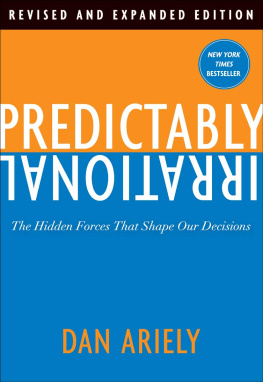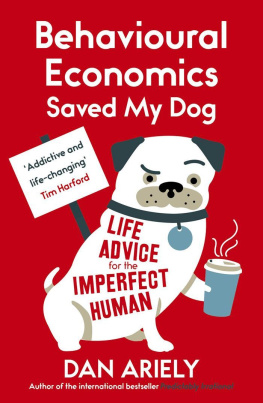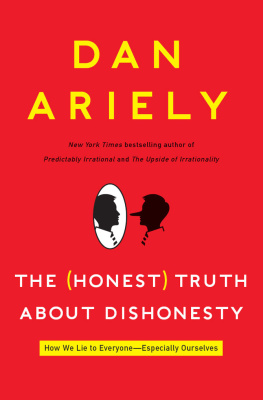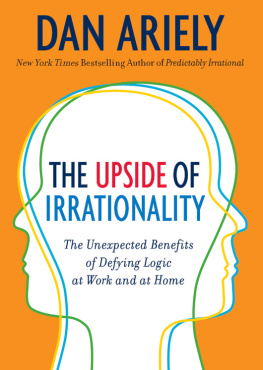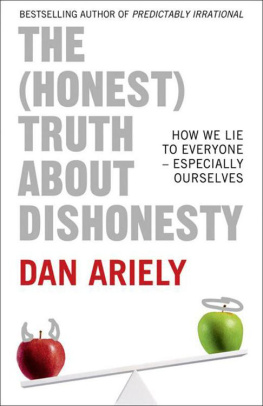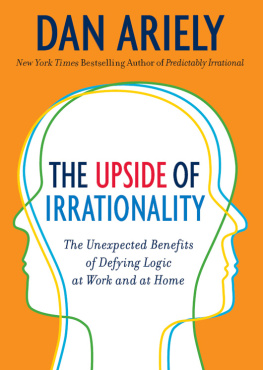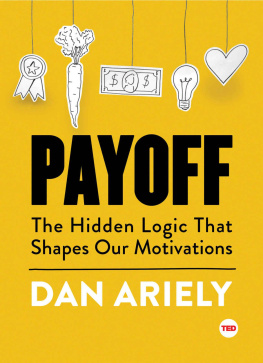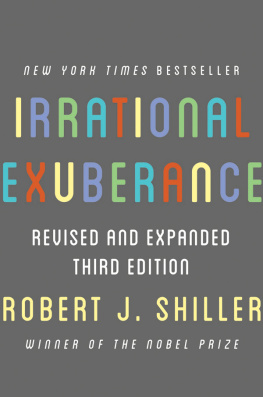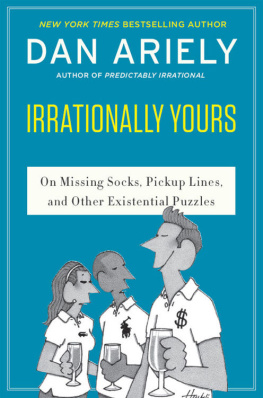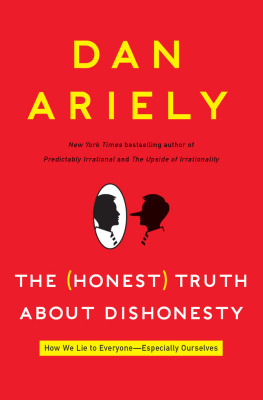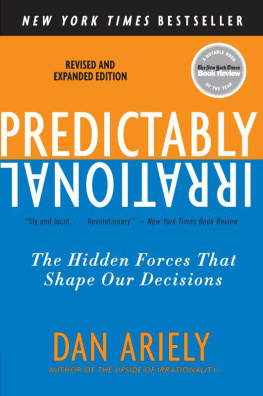Dan Ariely - Predictably Irrational, Revised and Expanded Edition: The Hidden Forces That Shape Our Decisions
Here you can read online Dan Ariely - Predictably Irrational, Revised and Expanded Edition: The Hidden Forces That Shape Our Decisions full text of the book (entire story) in english for free. Download pdf and epub, get meaning, cover and reviews about this ebook. year: 2009, publisher: HarperCollins, genre: Romance novel. Description of the work, (preface) as well as reviews are available. Best literature library LitArk.com created for fans of good reading and offers a wide selection of genres:
Romance novel
Science fiction
Adventure
Detective
Science
History
Home and family
Prose
Art
Politics
Computer
Non-fiction
Religion
Business
Children
Humor
Choose a favorite category and find really read worthwhile books. Enjoy immersion in the world of imagination, feel the emotions of the characters or learn something new for yourself, make an fascinating discovery.
- Book:Predictably Irrational, Revised and Expanded Edition: The Hidden Forces That Shape Our Decisions
- Author:
- Publisher:HarperCollins
- Genre:
- Year:2009
- Rating:5 / 5
- Favourites:Add to favourites
- Your mark:
- 100
- 1
- 2
- 3
- 4
- 5
Predictably Irrational, Revised and Expanded Edition: The Hidden Forces That Shape Our Decisions: summary, description and annotation
We offer to read an annotation, description, summary or preface (depends on what the author of the book "Predictably Irrational, Revised and Expanded Edition: The Hidden Forces That Shape Our Decisions" wrote himself). If you haven't found the necessary information about the book — write in the comments, we will try to find it.
Predictably Irrational, Revised and Expanded Edition: The Hidden Forces That Shape Our Decisions — read online for free the complete book (whole text) full work
Below is the text of the book, divided by pages. System saving the place of the last page read, allows you to conveniently read the book "Predictably Irrational, Revised and Expanded Edition: The Hidden Forces That Shape Our Decisions" online for free, without having to search again every time where you left off. Put a bookmark, and you can go to the page where you finished reading at any time.
Font size:
Interval:
Bookmark:
The Hidden Forces That Shape Our Decisions

To my mentors, colleagues, and students
who make research exciting
Dear readers, friends, and social science enthusiasts,
W elcome to the revised and expanded edition of Predictably Irrational .
Since my early days as a patient in the burn department, I have been acutely aware that humans engage in actions and make decisions that are often divorced from rationality, and sometimes very far from ideal. Over the years Ive tried to understand the silly, dumb, odd, amusing, and sometimes dangerous mistakes we all make, in the hope that by understanding our irrational quirks, we can retrain ourselves to make better decisions.
My theoretical and applied interest in irrationality has guided me to the emerging field of behavioral economics, where Ive embraced these quirks as a fundamental element of human behavior. In my research, Ive looked at a range of human foibles, asking questions such as these: Why do we get overexcited when something is FREE !? What role do emotions play in our decisions? How does procrastination play games with us? What are the functions of our strange social norms? Why do we hang on to false beliefs despite evidence to the contrary? Trying to answer these questions has provided me with endless hours of fun, and the new understanding that it brought has changed my professional and personal life.
The experiments my colleagues and I have conducted helped us discover why our participants (and humans in general, including ourselves) fail to reason properly. Its been satisfying to try to understand why we act the way we do, and fun to share our findings with people who have also wondered about their own decisions.
N EVERTHELESS, BEFORE THE financial crisis of 2008, Id hit a lot of roadblocks when trying to expand on the implications of our ideas, experiments, and findings. For example, after I gave a presentation at a conference, a fellow Ill call Mr. Logic (a composite of many people I have debated with over the years) buttonholed me.
I enjoy hearing about all the different kinds of small-scale irrationalities that you demonstrate in your experiments, he told me, handing me his card. Theyre quite interestinggreat stories for cocktail parties. He paused. But you dont understand how things work in the real world. Clearly, when it comes to making important decisions, all of these irrationalities disappear, because when it truly matters, people think carefully about their options before they act. And certainly when it comes to the stock market, where the decisions are critically important, all these irrationalities go away and rationality prevails.
This type of sentiment has not been restricted to Chicago economiststhe elite of rational economic thought. I have often been amazed at the prevalence of this sentiment (Id even dare to call it indoctrination) among people who have no particular training in economics. Somehow, the basic ideas of economics and the belief in overarching rationality have become so ingrained in our understanding of the social world around us that people from all walks of life seemed to accept them as basic laws of nature. When it came to the stock market, rationality and economics were thought to be as perfect a match as Fred Astaire and Ginger Rogers.
Whenever Ive been confronted with this type of criticism, I would try to dig a bit deeper and inquire why the belief in rationality surfaced whenever people made decisions in the stock market. My conversational partner would usually try patiently to persuade me to his way of thinking. Dont you understand, Mr. Logic would say, that when there is a lot of money on the table, people think especially hard about their options and do their best to maximize their returns.
Doing their best, I would say in rebuttal, is not the same as being able to make optimal decisions. What about individual investors, who put all their money in their own companys stock, dont diversify enough, and lose a substantial part of their fortune? What about people who are approaching their sixtieth birthday and still dont contribute to their 401(k)s? Theyre giving up free money, because they can withdraw it, along with the match from their company, almost immediately.1
OK, he would reluctantly agree. Its true that sometimes individual investors make mistakes, but professional investors must, by definition, act rationally because they deal with a lot of money and are paid to maximize their returns. On top of that, they work in a competitive environment that keeps them on their toes and ensures that they will always make normatively correct decisions.
Do you really want to argue, I would ask, squinting at him, that just because they are acting in their own best interests, professional investors never make big mistakes?
Not all the time, Mr. Logic would calmly reply, but in the aggregate they make normatively correct decisions. One person makes a random mistake in this direction, another makes a mistake in the other direction, and, collectively, all these mistakes cancel each other outkeeping the pricing in the market optimal.
At this point in the conversation, I must admit, my patience would start to wear out. What makes you think, I would ask, that the mistakes people makeeven if those people are professional investorsare simply random? Think about Enron. Enrons auditors were involved in substantial conflicts of interest, which ultimately led them to turn a blind eye (or perhaps two blind eyes, a stuffed nose, and plugged ears) to what was happening inside the company. Or what about the incentives of money managers, who make big bucks when their clients do, but dont lose anything when the opposite happens? In such environments, where misaligned incentives and conflicts of interest are endemic, people would most likely make the same mistakes over and over, and these mistakes would not cancel each other out. In fact, these mistakes are the most dangerous because they arent random at all, and in the aggregate, can be devastating to the economy.
At this point, Mr. Logic would take out the final weapon from his rational arsenal and remind me about (Zap! Pow!) the force of arbitragethe magical power that eliminates the effects of individuals mistakes and makes the market, as a whole, act perfectly rationally. How does arbitrage fix the market? When the markets are free and frictionlessand even if most investors are irrationala small set of supersmart, rational investors will take advantage of everyone elses poor decisions (for example, they might buy a stock from those of us who mistakenly undervalue it), and in the process of competing for a bigger piece of the pie make a lot of money for themselves and restore market pricing to its rational and correct levels. Arbitrage is the reason why your notion of behavioral economics is wrong, Mr. Logic would tell me triumphantly.
Sadly, arbitrage is not an idea we can test empirically, because we cannot run one version of the stock market consisting of Joe Schmoes like you and me and another one consisting of Joe Schmoes plus some of these extra-special, super-rational investorsthese Supermen who save the financial world from danger every day, while retaining their anonymous Clark Kent identities.
I wish I could tell you that I would often persuade my conversational partner to accept my point of view, but in almost all cases it would become very clear that neither of us was going to be converted to the others viewpoint. Of course, I ran into the biggest difficulties when arguing for irrationality with card-carrying rational economists, whose disregard of my experimental data was almost as intense as their nearly religious belief in rationality (if Adam Smiths invisible hand doesnt sound like God, I dont know what does). This basic sentiment was expressed succinctly by two fabulous Chicago economists, Steven Levitt and John List, suggesting that the practical usefulness of behavioral economics has been shown to be marginal at best:
Font size:
Interval:
Bookmark:
Similar books «Predictably Irrational, Revised and Expanded Edition: The Hidden Forces That Shape Our Decisions»
Look at similar books to Predictably Irrational, Revised and Expanded Edition: The Hidden Forces That Shape Our Decisions. We have selected literature similar in name and meaning in the hope of providing readers with more options to find new, interesting, not yet read works.
Discussion, reviews of the book Predictably Irrational, Revised and Expanded Edition: The Hidden Forces That Shape Our Decisions and just readers' own opinions. Leave your comments, write what you think about the work, its meaning or the main characters. Specify what exactly you liked and what you didn't like, and why you think so.

